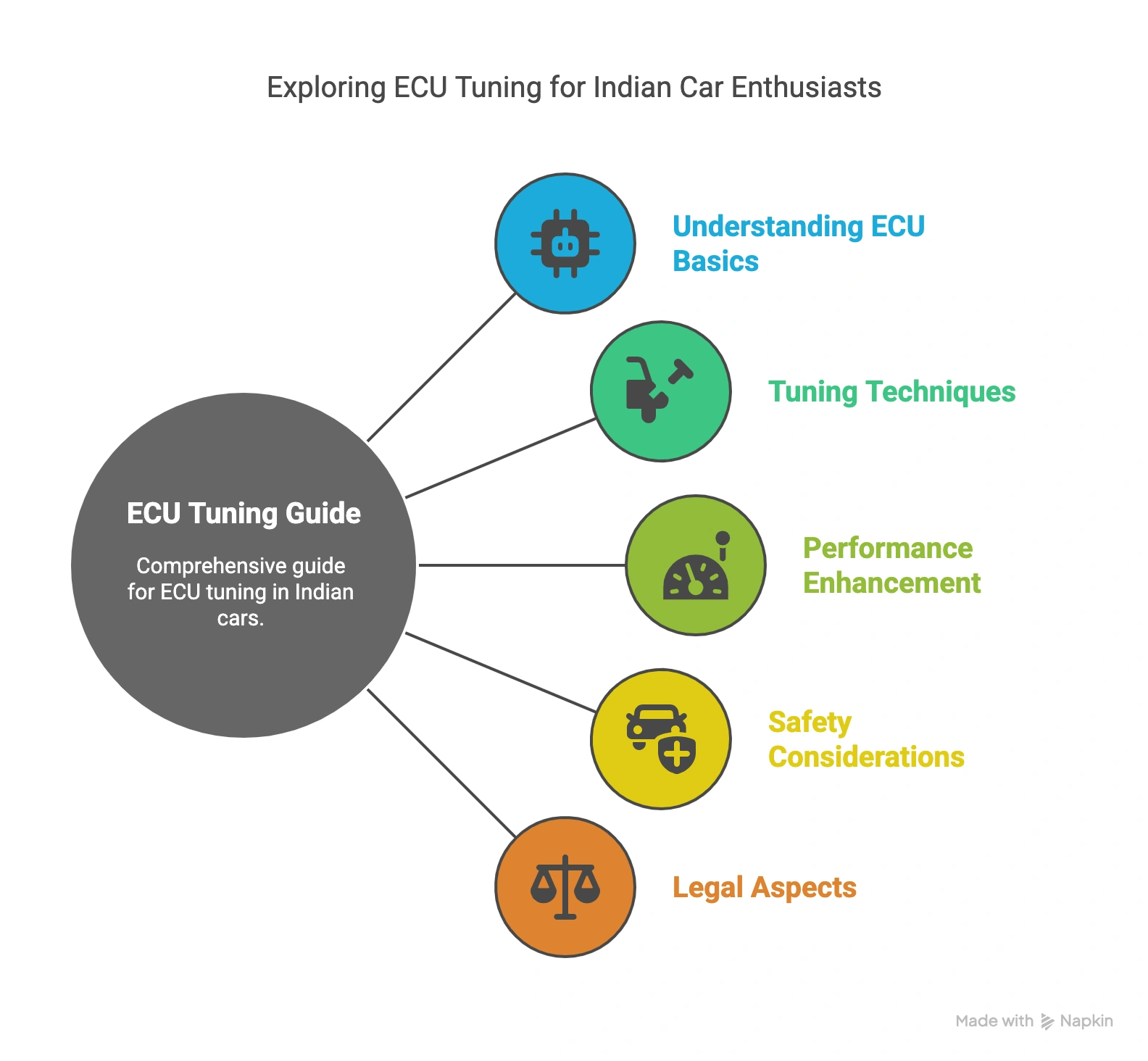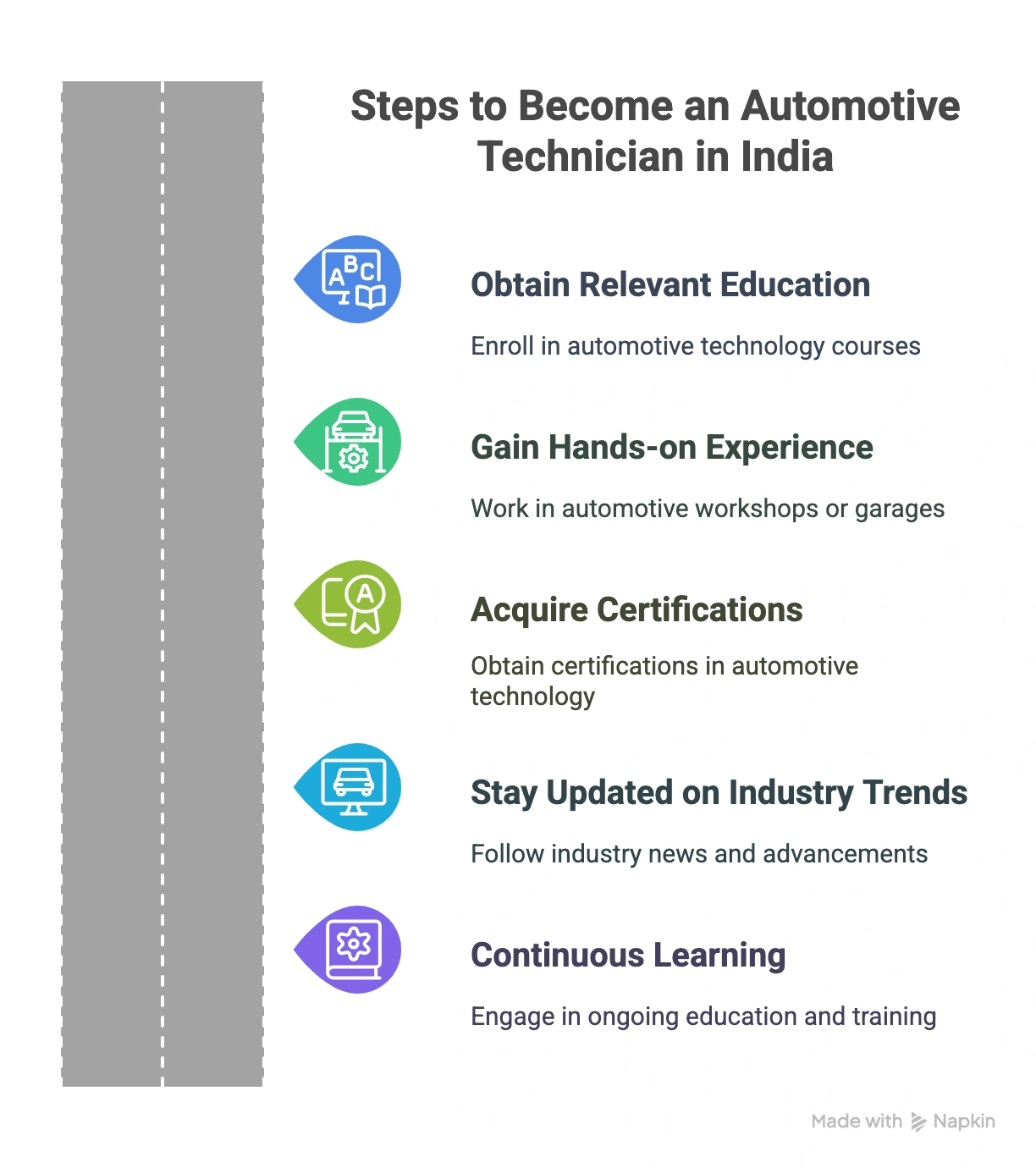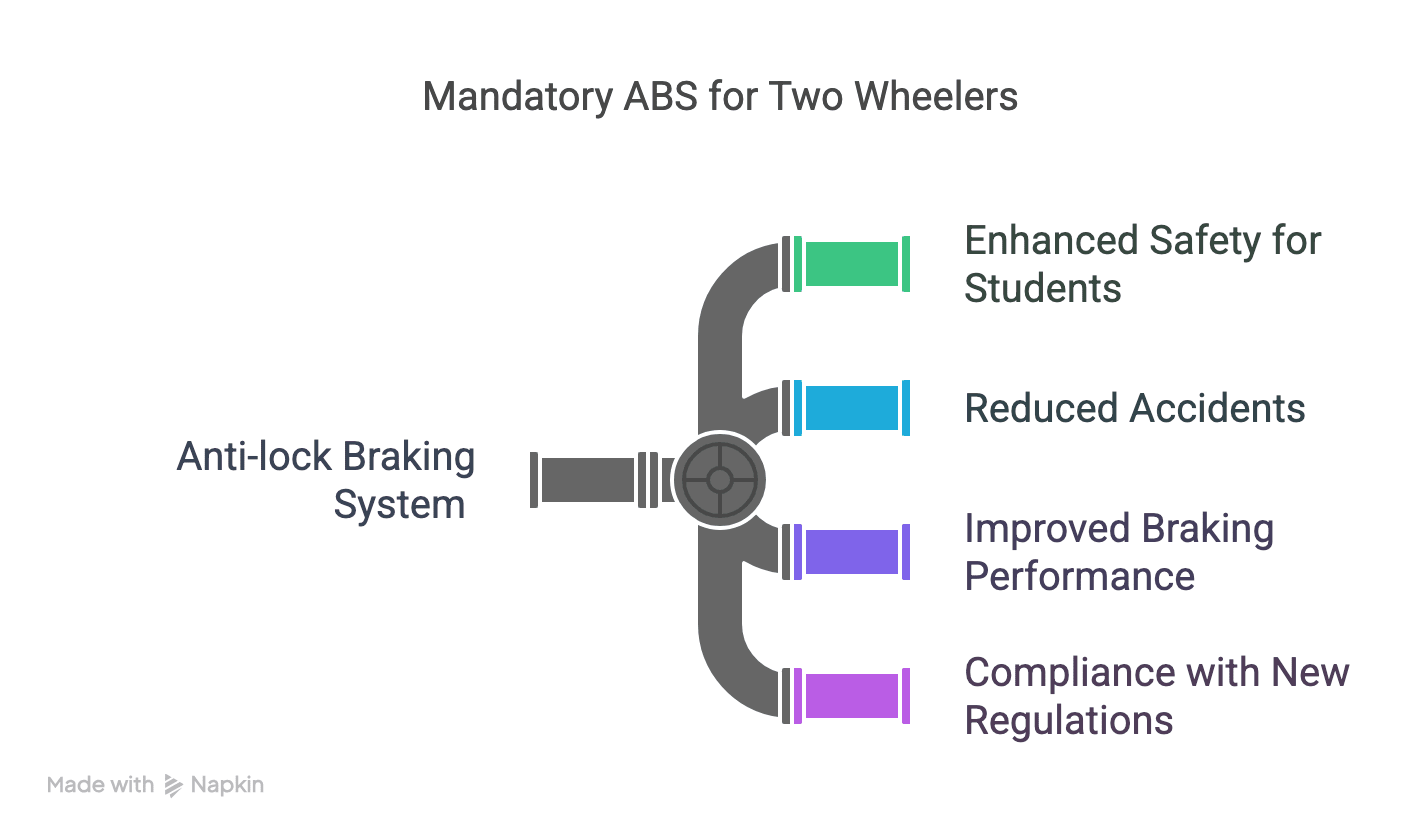Ultimate Guide to ECU Tuning: Everything Indian Car Enthusiasts Need to Know
What is an ECU and How Many Does a Car Have?
The Electronic Control Unit (ECU) is essentially your vehicle’s brain. It’s a microcomputer that manages critical functions in your car using data from various sensors.
Most modern cars have multiple ECUs working together:
- The main Engine Control Module (ECM) or Engine Control Unit (ECU)
- Transmission Control Module (TCM)
- Body Control Module (BCM)
- Brake Control Module (BCM) or Anti-lock Braking System (ABS)
- Power Steering Control Module
- Airbag Control Module
A typical modern car can have anywhere from 5 to 100 ECUs depending on its complexity and features. Economy cars may have fewer (5-20), while luxury and high-performance vehicles can have 50+ ECUs managing everything from engine performance to ambient lighting.
How ECU Tuning and Remapping Works
The Basics of ECU Tuning
ECU tuning involves modifying the software (or “map”) in your car’s ECU to optimize performance, fuel efficiency, or both. The ECU controls critical parameters like:
- Fuel injection timing and quantity
- Ignition timing
- Turbocharger boost pressure (in turbocharged engines)
- Valve timing
- Rev limiters and speed limiters
Think of ECU tuning as upgrading your smartphone’s operating system, but for your car.
ECU Remapping Process
- Diagnostic Check: Mechanics first read the current ECU settings and check for any existing issues.
- Data Backup: Your original ECU settings are backed up (always ensure this step is done).
- Modification: The ECU software is modified using specialized equipment and software.
- Testing: The car is tested to ensure the new settings work properly.
- Fine-tuning: Adjustments are made based on real-world performance.
The main methods of ECU tuning include:
- Chip Tuning: Physical replacement of the microchip (older method).
- OBD Tuning: Using the On-Board Diagnostics port to flash new software.
- Bench Tuning: Removing the ECU completely to modify it (most invasive).
Learning ECU Tuning in India
How to Learn ECU Tuning
- Educational Background: A foundation in automotive engineering, electronics, or computer science is helpful.
- Specialized Courses:
- Reynlab: India’s top automotive training platform offering ECU tuning and remap courses for both petrol and diesel vehicles. They provide hands-on training with real equipment and have successfully trained students from across India, with many alumni now working in top-tier automotive companies.
- Online Resources:
- Reynlab Online Academy: Offers comprehensive online ECU tuning courses from basic to advanced levels, suitable for anyone with an interest in automobiles including automotive engineers, mechanics, students, and car enthusiasts. Their Level 1 course covers automotive electronics fundamentals and basic tuning processes.
- Hands-on Experience: Consider apprenticing at a reputable tuning shop to gain practical skills.
- Software and Equipment: Familiarize yourself with tuning software like:
- TunerStudio: Popular for MegaSquirt ECU systems and adaptable for many custom setups
- VAGDEC: Specialized for Volkswagen, Audi, Skoda, and Seat vehicles (very popular in India)
- HP Tuners
- EcuTek
- Hondata (for Honda vehicles)
- Haltech
Required Knowledge Base:
- Engine mechanics and thermodynamics
- Fuel systems and combustion processes
- Electronics and sensor operations
- Computer programming basics
- Diagnostic procedures
DIY ECU Tuning at Home
Can You Tune Your ECU at Home?
Yes, but with important caveats. Home ECU tuning is possible for enthusiasts with:
- Basic Equipment:
- OBD-II scanning tool or interface
- Laptop with appropriate tuning software
- Wideband O2 sensor for air-fuel ratio monitoring (recommended)
- Starting Point:
- Begin with simple adjustments like increasing rev limits
- Gradually work up to fuel and timing maps as you gain experience
- Always make incremental changes and test thoroughly
- Safety Considerations:
- Always back up your stock tune
- Make small, incremental changes
- Have a strategy to restore default settings if something goes wrong
- Understand that mistakes can cause engine damage
- Legal Considerations: In India, major modifications may affect your vehicle’s registration status or insurance coverage.
Motorcycle ECU Tuning
Motorcycle ECU tuning follows similar principles as car tuning but with some differences:
- Access Methods:
- Many modern bikes have OBD-like diagnostic ports
- Some require specialized interfaces or direct connection to the ECU
- Plug-and-play options like Power Commanders are popular
- Common Modifications:
- Removing speed limiters (track use only)
- Optimizing for aftermarket exhaust systems
- Adjusting for different fuel quality
- Improving throttle response
- Popular Tools for Bike Tuning in India:
- Power Commander by Dynojet
- Bazzaz Performance
- Woolich Racing products
- ECU Flash tools for specific manufacturers
Performance Gains from ECU Tuning
How Much HP Does ECU Tuning Add?
Performance gains vary significantly based on:
- Type of Engine:
- Naturally aspirated engines: Typically 5-15% power increase
- Turbocharged engines: Often 15-30% power increase
- Diesel engines: Usually 20-30% increase in power and torque
- Real-World Examples:
- A stock Maruti Suzuki Swift may gain 5-8 BHP from a tune
- A turbocharged Volkswagen Polo GT TSI might see 15-25 BHP increase
- Many diesel SUVs can gain 20-40 BHP with proper remapping
- Supporting Modifications:
- Cold air intake: Additional 3-5 BHP
- Performance exhaust: Additional 5-10 BHP
- Intercooler upgrades (for turbo cars): Additional 5-15 BHP
Remember that these gains may require premium fuel to realize their full potential.
Costs of ECU Tuning in India
How Much Does ECU Tuning Cost?
The cost of ECU tuning in India varies based on several factors:
- Standard ECU Remapping:
- Economy Cars: ₹9,200 – ₹17,250
- Premium Hatchbacks/Sedans: ₹13,800 – ₹28,750
- Luxury/Performance Cars: ₹28,750 – ₹57,500
- Motorcycles: ₹5,750 – ₹23,000
- Custom Dyno Tuning (more precise, uses dynamometer):
- Basic Dyno Session: ₹17,250 – ₹28,750
- Comprehensive Tune with Multiple Runs: ₹34,500 – ₹69,000
- DIY Equipment Costs:
- Basic OBD Scanner: ₹2,875 – ₹9,200
- Professional Interface: ₹17,250 – ₹57,500
- Tuning Software License: ₹17,250 – ₹80,500
- Wideband O2 Sensor: ₹9,200 – ₹23,000
- Cost Factors:
- Vehicle make and model
- Complexity of the tune required
- Shop reputation and expertise
- Location (metro cities tend to be more expensive)
Value Considerations:
- A quality tune from a reputable shop is worth the premium
- Low-cost tunes may use generic maps rather than vehicle-specific optimization
- Always check reviews and ask for references before choosing a tuning shop
Time Required for ECU Tuning
How Long Does ECU Tuning Take?
The time required varies based on the tuning method:
- Pre-made Maps:
- Basic flash: 1-2 hours
- Including diagnostic checks: 2-3 hours
- Custom Dyno Tuning:
- Initial setup and baseline runs: 1-2 hours
- Tuning process with multiple runs: 3-5 hours
- Fine-tuning and verification: 1-2 hours
- Total: Often a full day (5-8 hours)
- Learning to Tune:
- Basic understanding: 1-2 months of study
- Intermediate skills: 6-12 months with regular practice
- Professional-level expertise: 2+ years of dedicated learning and practice
Benefits and Risks of ECU Tuning
Potential Benefits:
- Increased power and torque
- Improved throttle response
- Better fuel efficiency (when tuned specifically for this)
- Smoother power delivery
- Removed speed limiters (for track use only)
- Optimized performance for modifications like exhaust systems
Possible Risks:
- Voided manufacturer warranty
- Increased engine strain
- Potential reliability issues if improperly tuned
- Increased emissions (may fail pollution tests)
- Insurance complications
- Legal issues if modifications aren’t properly documented
Conclusion: Is ECU Tuning Right for You?
ECU tuning can transform your driving experience, but it’s important to approach it with the right expectations and knowledge. For Indian car enthusiasts, especially students on a budget, consider:
- Research thoroughly before committing to any modifications
- Choose reputable tuners with proven track records
- Start with mild tunes if you’re new to car modifications
- Budget for quality work rather than seeking the cheapest option
- Consider warranty implications if your vehicle is relatively new
Whether you’re looking to squeeze more power from your daily driver or optimize your motorcycle for weekend rides, ECU tuning offers a gateway to customization that was once available only to professional racers and specialized workshops.
Remember that responsible tuning balances performance with reliability—the goal should be a vehicle that’s not just faster, but still dependable for your daily needs.




